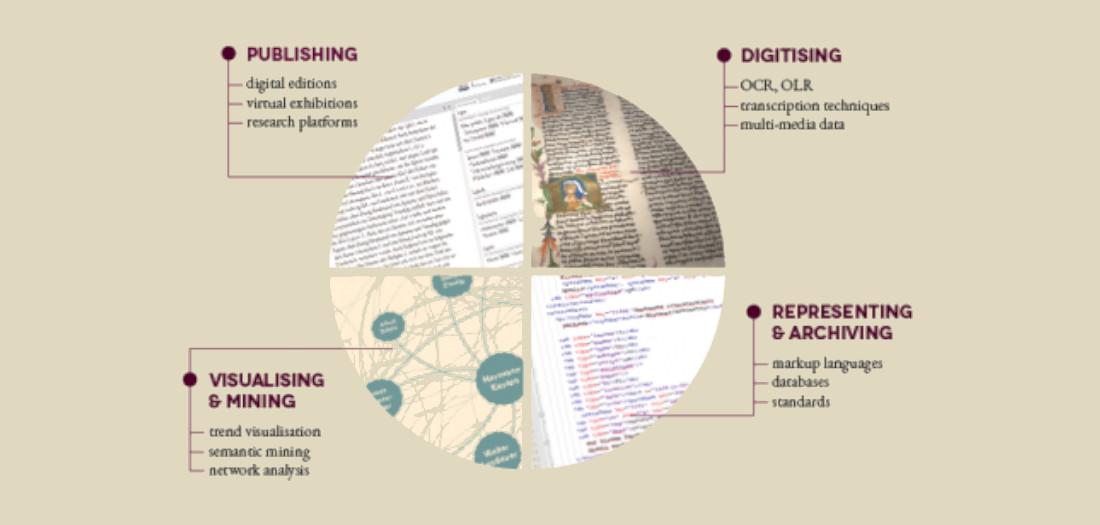Master's degree in Digital Humanities
Apply now in Trier!
25.08.2016 | General

Going on to a master’s degree after completing your bachelor’s degree can be a worthwhile investment in your future - especially if you choose an emerging subject with excellent job prospects. The Master’s degree in Digital Humanities at Trier University offers many exciting perspectives. Apply by September 2, 2016 or, as a Bachelor graduate from the University of Trier, by September 30, 2016.
Why study digital humanities? Here are some good reasons:
Digital Humanities
What has long been considered difficult to combine in the university environment is now brought together profitably by the Digital Humanities (DH)As an interface between the humanities, computer science and computational linguistics, an innovative and attractive field of activity is emerging that breaks through disciplinary boundaries and creates new approaches to subjects related to humanities and cultural studies. The aim is to supplement conventional methods with computer-aided procedures. In this way, original research questions can be formulated and new answers found. The activities of the digital humanities are very diverse. Typical fields of activity include digital editions, online archives, web exhibitions and themed portals, virtual research environments and analysis tools, web-based databases, 3D visualizations and much more.
The area is expanding rapidly and always offering new opportunities - for science, but also for the commercial market.
A degree with a perspective
Graduates with a Master of Science degree (M.Sc.) in Digital Humanities have a dual qualification that is in great demand both nationally and internationally. There is a need for digital humanists in cultural institutions (museums, archives, libraries, art galleries) as well as in research and development. Career opportunities also open up in the publishing and publishing industry, in the tourism industry or in authorities and other public service institutions.
Why you should study in Trier!
Trier and its cultural heritage
As the oldest city in Germany, Trier offers a variety of ideal conditions for a DH course. The city's culturally and historically significant heritage is evident in numerous architectural monuments and is preserved in museums and archives. The Roman buildings have even been a UNESCO World Heritage Site since 1986 and there are also several World Heritage Sites in the vicinity.
In safeguarding our cultural heritage, the digital humanities play an increasingly important role and thus make an important contribution to society as a whole. The Trier DH course is closely linked to its location. This repeatedly results in DH projects with regional and supra-regional cooperation partners, in which students can gain practical experience.
Many years of DH experience and exemplary support
The subject Computational Linguistics and Digital Humanities supports the DH master’s course together with the Competence Center for Electronic Indexing and Publication Processes in the Humanities / Trier Center for Digital Humanities (TCDH) with significant involvement of computer science. Other subjects such as German, English, phonetics and art history complete the teaching program. It is possible to set individual priorities within the curriculum. DH students benefit not only from the excellent support situation and diverse possibilities for practical work in ongoing research projects, but also from the decades of experience of the TCDH. Founded in 1998, it is one of the oldest and largest centers of its kind in Germany and enjoys an excellent reputation worldwide. The TCDH is known, among other things, for its projects in digital edition science, for retro-digitization, processing and networking of numerous lexicographical standard works or for research on medieval manuscripts and monastery libraries.
Global and well networked
The digital humanities thrive on their interdisciplinary and transnational openness. National and international networking is of fundamental importance in this area. The science location Trier is part of a large region that is increasingly working together in research and teaching. Close cooperation does not only exist with research and cultural institutions in Luxembourg, France and Belgium. There is also an intensive exchange with other European and worldwide institutions.
Do you want to become a digital humanist?
What requirements do you have to meet?
Basically, for a successful master’s degree in digital humanities, the willingness to be able to combine two ways of thinking is important. Therefore, the course is aimed at students with a bachelor's degree (or comparable) in a humanities or cultural studies (e.g. philological subjects, history, art history, philosophy, phonetics), in computer science or computational linguistics. The grade of the bachelor's degree must be at least 2.5. You can apply here for the summer and winter semesters.
How is your degree going?
The course extends over two years and is offered as a core subject, i.e. without compulsory minor subjects. The curriculum starts with an orientation phase (1st-2nd semester) in which missing skills in computer science or in the humanities (depending on the respective bachelor's degree) and basic knowledge of the DH are acquired. In the 3rd and 4th semesters, core competencies in digital humanities are taught and complemented by elective options in the field of computer science and humanities. The course also contains practice-oriented courses. .
Link: My studies - information portal of the University of Trier for prospective stud…, Homepage of Computational Linguistics and Digital Humanities at the University …, Application portal of the University of Trier

